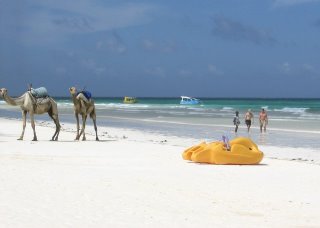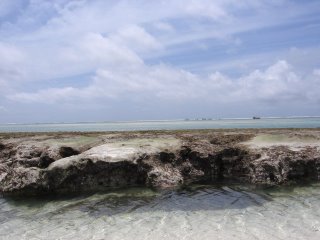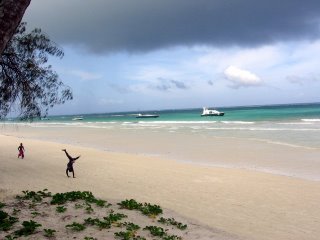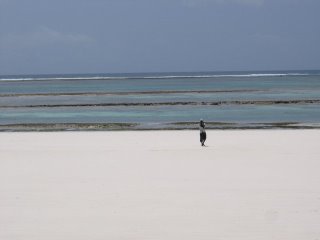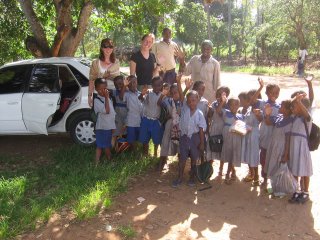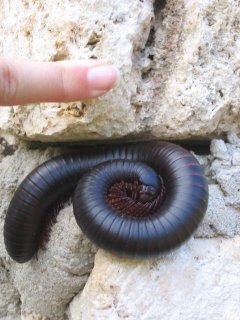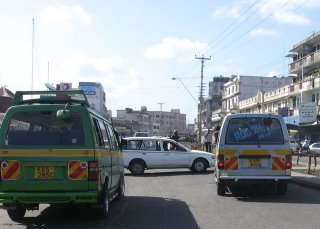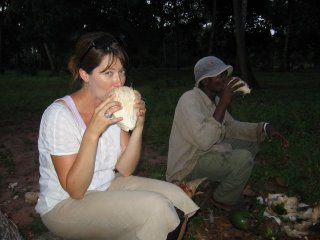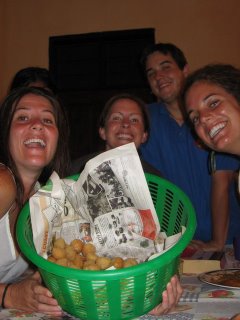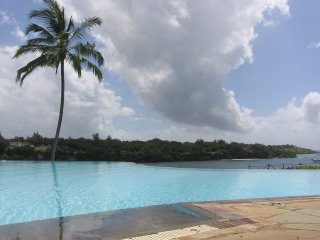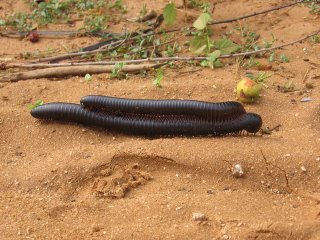Safari
The van picked us up bright and early yesterday morning for a 3-hour ride on the typically horrible Kenyan roads and we jounced and bumped until I thought my spleen would rupture. The drive was so difficult, particularly when the rain came and we began slipping on the mud in between bounces, that sitting in my window seat felt like hard labor and the possibility of seeing African animals in vivo wasn't the only reason I was pleased that we arrived at the park.
At the gate, the top of the van was popped up, so that we could stand and see (and take pictures) of the park's inhabitants. We were not allowed to get out of the van at any time, but were satisfied with the unimpeded view from the pop-top. The driver, checking the road and then scanning the horizon as we drove through the park, was the first to spot giraffes. or so he said as he pulled the van over and pointed at some specks in the horizon. I craned my neck to no avail and didn't totally believe that they were out there. We drove a while longer and he pulled over again. We all popped our heads out the top and swung cameras around to look at....I'm not sure. I didn't see it. By this time, my internal dialogue began to focus on reframing the safari experience. "The animals in this huge park certainly won't stand by the side of the road. I should just enjoy the pretty view. It's okay if I don't see any animals." And so on. We continued.
Up ahead, we could see a cluster of other white vans pulled to the side of the road and once again looked out to see...something...something...oh my god! It's a lion! There was a female lion sunning herself on a rock maybe 100 yards away. I snapped pictures and she looked up, a little bored by us, and collapsed again. The drive continued and a short while later we could all see that we were driving up to another lion, sleeping under a tree. This time it was a male lion, possibly with the biggest roundest belly I've ever seen. He either has liver disease or was recovering from some type of feast. He was only 30 yards from us, practically close enough to spit on, though no one dared of course. After many pictures and pulling around for a slightly better look at his face (many of the animals were unfortunately posed and I'm afraid I may have more butts than noses in my snaps), we continued.
Next we saw a waterbuck, a large member of the antelope family. Then a group of Thompson's gazelles. Then some zebra far off in the distance. Then African elephants in the distance. Then African elephants closer to the road. The safari, rather than seeming cheesy or touristy, was a fantastic experience and we were all excited by each new find. Amy made a list of the animals we spotted:
Ostrich (male and female)
African elephant
Zebras
Jerunuk (AKA giraffe-gazelle)
Thompson gazelle
Secretary bird
Lion (male and female)
Antelope
Hartebeest
Waterbuck
Baboon
Warthog (which our Kenyan friend pronounced "warth-og")
Grant gazelle
Yellow-necked spuffa (which our Kenyan friend called a "yellow nekkid spuffa" much to my amusement)
Banded mongoose
Buffalo
Guinea fowl
Rock hyrax
Egyptian goose
Lesser Kudu
Dik dik (the smallest member of the antelope family and about the size of a mini poodle)
Oryx
It was a wonderfully successful game drive and apparently the overcast sky and cool temperatures had brought out many more animals than are typical. We went to our lodge to check in and eat a much looked forward to lunch. The lodge, all of the rooms, the restaurant, decks, and patios all look over a few watering holes at the bottom of the hill we were perched on. Lunch had to wait as we walked toward the restaurant and saw more elephants at the watering hole. I raced down with the others to the camera hide, a viewing station located 30 feet or so from the hole and accessed through an underground tunnel. As I snapped pictures I watched the elephants - including several small calves - drink, wander aimlessly, and scratch themselves on the large rocks nearby. Finally, the hunger getting the better of me, I met up with the others and we went to lunch. We could watch the elephants from our table and saw the group at the watering hole wander off in single file and another group approached from the distance.
After lunch it was time for another game drive. We didn't have to go far for our first find, a group of 7-9 lions laying out on a rock near the lodge. Later, after spotting more members of the antelope family, we saw a female lion almost hidden in tall grass. As we watched, she rolled on her back and two small cubs tried to climb on her stomach. Down another road, two elephants crossed almost directly behind our van and later we saw a buffalo. This buffalo was wandering alone and the driver explained that a single buffalo was very easy prey for lions. On the way back to the lodge we saw the lions, still on the rock. An elephant was passing by near them and the lions seemed a little perturbed. One stood up and walked closer to the elephant - it seemed to be giving it the stink-eye.
We found out later that shortly after we left the buffalo, other safari groups saw it chased by lions. Today on our game drive we saw a dead buffalo, perhaps the same one. We had another large meal last night and watched the bats fly around and the rock hyraxes precariously climbing trees. I fell asleep to the sounds of baboons scuttling across the roof and the loudest frogs I've ever heard in my life.
On our game drive this morning we saw two types of giraffe (Masai and Reticulated) and more antelope. On returning to the lodge for breakfast we were astonished to see a huge herd - maybe 200-300 animals - of buffalo at the watering hole. They crowded close together to stand in the water and drink and many of the buffalo were being ridden by little birds, just like you see on a nature show. There were so many buffalo and they splashed and drank for so long I was afraid the watering hole would dry up. Finally, it seemed that most of the herd managed to shuffle through and as we checked out of the lodge we could see them resting a little ways off.
There was another jouncing van ride to get through which was made a little easier by chocolate cream oreos and a beer at a stop along the way. It feels like I've lived a year in two days and I'm already excited to go again on safari someday.
